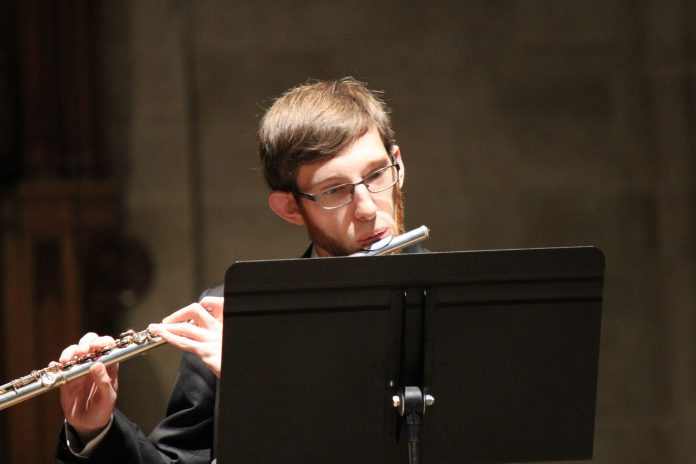At some time during their senior year, performance concentrations must demonstrate their master for their craft by performing a recital, open to the general student body. In the case of Daniel Lester ‘18, however, he did much more than simply perform in his recital. He was given full autonomy to create his own playbill for the event and chose his own supporting musicians. The recital featured seven flute compositions of Lester’s choosing and accompaniment from Johnny Tamburro ‘18 on guitar, Anna Birna Turner ‘18 on flute and Vincent Trovato, the resident piano accompanist. The songs chosen for the recital covered a wide variety of music, showing off Lester’s sweeping knowledge as a musician and range as a floutist.
The song order was in a classical ebb and flow style, switching between tantalizingly wistful, slow pieces and satisfyingly resonate faster pieces. Lester describes his reasoning as “I went [with] a slow piece [‘Pavane pour une infant défunte’] to start off with/get warmed up on, a faster piece [‘Arabesque in Memoriam’], [a] slow piece [‘Le Cygne] and then a big ten-minute piece [several movements from ‘Fantaisie Brillante sur “Carmen”’]to end out the first half. And then same thing for the second half: start off with a slow piece [‘Prélude à l’après-midi d’un faune’], [a] faster piece [‘A Ways In…’] and then a big ten-minute piece to finish off the second half [two movements from ‘Sicilienne et Burlesque’].”
“Pavane pour une infant défunte,” or “Pavane for a Dead Inanta,” or a slow dance from the 16th and 17th century for a Dead princess of a Spanish or Portuguese monarch, by Maurice Ravel, was composed as a piano solo piece but was later adapted to be a flute piece with piano accompaniment. As the title suggests, the piece was almost hauntingly slow with a flowing, somber melody. “Arabesque in Memoriam,” or an ornate and somewhat whimsical composition in a Memoriam, by Philip Glass, gave off a very naturalistic sound with its simple, repeated passages, enticing the audience in a very minimalist fashion. “Le Cygne,” or The Swan, by Camille Saint-Saëns, accompanied by the genial strumming of the guitar, majestically emitted a soothing melody calming all on lookers. “Fantaisie Brillante sur ‘Carmen,’” or Brilliant Fantasy on Carmen, by François Borne, is an integral piece for Romantic flute music as well as all of Romantic music in general, including but not limited to iconic tunes used in many different mediums.
“Prélude à l’après-midi d’un faune,” or Prelude to the Afternoon of a Faun, by Claude Debussy, was originally written for a full orchestra but Lester performed the piece solo, using a bass flute. A bass flute plays an octave lower than the regular flute and it produces a much more resonating sound giving off the “full-body” feel that an orchestra has with just one instrument. “A Ways In…” is an extremely recent composition by Josh Oxford that follows the twelve-tone technique by not being set in any note but instead using all twelve notes equally without giving preference to any one note. The piece is a three-instrument song with a piano accompaniment, supporting flute and of course the main flute. “Sicilienne et Burlesque,” or Sicilian and Burlesque, by Alfredo Casella, is a more upbeat composition filled with ascending groupings of notes and fluttering sections, giving the piece a sense of joy and invigoration.
Reflecting on his time here at Muhlenberg, Lester talked about what it was like for him to go through this process of being a music major. “I’ve been taking lessons since sophomore year – I took a year off freshman year; I’ve been taking lessons before then. I just knew that I didn’t want to go the history route, I didn’t want to go the composition route… I wanted to be [a] performance [concentration] and all performance concentrations are required to do a senior recital. It’s something you start preparing for with the student recitals where you just play one piece in here to get you warmed up and used to playing for a crowd. You just keep working on it many hours a week, and it gets a little stressful because you have other school work going on, but it’s really a worthwhile experience in the end to play for an audience and have so many people come out and support you.”
Senior recitals are the ultimate opportunity for performance concentration music majors to show the work, practice and effort they put into developing themselves as artists.
Ethan is a freshman with an intended neuroscience major and an eye for shiny things like arts and culture. Self plug for the MCEMS training corps, science journalism club, (maybe) the MCA, and many other non-writing based nerdy clubs, but most importantly he's a proud member of the A&C writing gang.






















